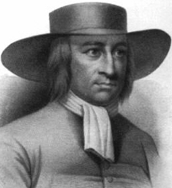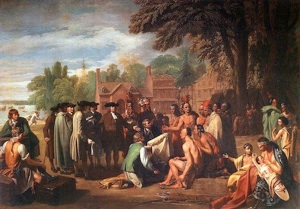A Brief Overview of the History of Quakerism
Foundation
Quakerism was founded in England during the mid 1600s when George Fox began questioning the established church. Fox met many people who professed to believe in God but whose actions showed them to be hypocrites. He found many people who adhered to the forms of Christianity but forgot that the essential element of Christ's message was Love. Fox had a revelation that only Jesus could answer the questions he had. This revelation moved Fox to roam England and share with others that they too could discern God's will by listening to that of God within them. He taught that worship should consist of sitting quietly in Meeting, listening for the inner Christ or inner light to give guidance. This form of worship is now referred to as an Unprogrammed Meeting. By worshiping in this manner, early Quakers felt they were following the example that Jesus had set for the original Christians. Though not a new idea, this form of worship was revolutionary at the time. Fox and fellow "seekers" referred to themselves as Children of Light and Friends of the Truth, which is where the name Religious Society of Friends, used today, originated.

Friends' faith led them to believe all were equal before God. Acting upon this belief, Friends refused to tip their hats to aristocrats and tried to live simply, which they showed outwardly by wearing simple clothes. Valuing everyone equally also led to trying to prevent conflict and inspired early Quakers to work toward peace in a time fraught with duels and war. Friends also believed that one should speak the truth at all times and refused to swear oaths (oaths insinuate that one only tells the truth when sworn to do so). Founder, George Fox, and many early Friends were imprisoned for their beliefs and actions, but the number of Friends increased anyway, and Meetings for Sufferings were begun by Margaret Fell to care for prisoners and their families (the beginning of taking action toward prison reform). When told by a judge that he should fear the consequences of his actions, Fox responded that only fear of the wrath of the Lord could cause him to quake. From this response the term "Quaker" was coined to describe members of the Religious Society of Friends. As did folks from many other religious groups in England at that time, many Friends moved to the New World during the late 1600s to escape religious persecution.

In The New World
By 1700 Quakerism had spread to Jamaica, Barbados, and the American colonies. In the American colonies, William Penn, one of the best known early American Quakers, founded Pennsylvania. For his colony, Penn created a government that was based upon Quaker principles. The colony, as a result, welcomed people of any religious faith to live there and work together. Colonists in Pennsylvania also had good relations with Native Americans due to the government making treaties that benefited both parties, and that were upheld by the colonists.
When folks started migrating West during the 1800s, groups lacked the numbers to start single denomination churches. For this reason, individuals from different Christian denominations began worshiping together. This resulted in a new form of Quakerism, the Programmed Meeting. Programmed Meetings have a pastor and sermon for part of the church service, and silent worship as another component. To this day there remains a spectrum of Quaker Meeting formats ranging from Unprogrammed Meetings, which hold silent worship in which ministry is inspired by God through each individual, to highly Programmed Meetings which follow a format similar to typical protestant churches. Despite the worship format, Friends from both ends of the spectrum have been led toward similar beliefs and actions. Today there are thousands of Quakers in countries all over the world.
Southern United States
A large community of Quakers settled in North Carolina during the late 1600s. From there, they spread throughout the South until just prior to the Civil War. At that time Quakers began leaving the South because they were abolitionists and could not support the Confederacy. (Their belief in equality, compelled them to be among the first to start the underground railroad and work to end slavery.) Friends began to re-establish themselves in the South during the late 1920s. During the 1960s Quakers supported the Civil Rights movement, and continue to be active in the South, as well as across the world.
Athens, Georgia
The Athens Meeting began in the mid 1980s, with a group of friends that began meeting in each others homes. This small worship group, under the care of the Atlanta Meeting, grew and formed into a Monthly Meeting during the mid-1990s. Our current Meeting, while small in number, is a vibrant community of individuals who support and encourage one another in spiritual growth and beyond.